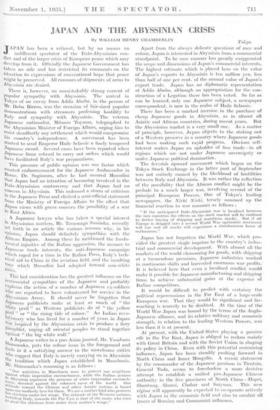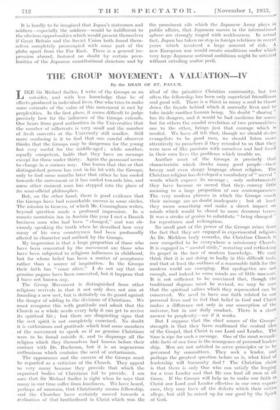JAPAN AND THE ABYSSINIAN CRISIS
JAPAN has been a reticent, but by no means an U. indifferent spectator of the Italo-Abyssinian con- flict and of the larger crisis of European peace which may develop from it. Ofiicially the Japanese Government has taken no side and has restricted its comments on the .situation to expressions of conventional hope that peace Might be, All rumours of shipments of arms to Abyssini are denied.
There is, however, an unmistakably strong current of Popular sympathy with Abyssinia. The arrival in Tokyo of an envoy fromAddis Ababa, in the person of baba " ninon, was the occasion of fair-sized popular demonstrations with streamers profesSing hostility to Italy and sympathy with Abyssinia. The veteran Japanese nationalist, Mitsuro Toyama, telegraphed to the Abyssinian Minister of Foreign Affairs, urging him to resist steadfastly any settlement which would compromise his country's independence. A movement has been started to send Emperor Haile Selassie a finely tempered Japanese sword. Several cases have been reported when Japanese firms refused to carry out orders which would have facilitated Italy's war preparations.
This pressure of public opinion was one factor which ereated embarrassment for the Japanese Ambassador in Rome, Dr. Sugimura, after he had assured Mussolini that Japan had no intention of becoming involved in the Italo-Abyssinian controversy and that Japan had no concern in Abyssinia. This unloosed a storm of criticism ja the Japanese Press and elicited a semi-official statement from the Ministry of Foreign Affairs to the effect that japan views with grave concern the possibility of a war M East Africa.
A Japanese lawyer who has taken a special interest ill Abyssinian matters, Mr. Tomonaga SumiOka, recently Set forth in an article the various reasons why, in his opinion,. Japan should definitely sympathise with the African Empire. Among these he mentioned the funda- mental injustice of the Italian aggression, the menace to Japanese trade interests, the anti-Japanese campaign Which raged for a time in the Italian PreSs, Italy's tech- Meal aid to China in the aviation field, and the insulting tone which Mussolini had adopted toward non-white ras.
This last consideration has the greatest influence on the 8elailnental sympathies of the Japanese and probably tx•plairiS the action' of a number of Japanese ex-soldiers who arc reported to have volunteered for service in the 41.)-ssinian Army. It should never be fOrgotten that 4ttpaiiese publicists make at least as much of " the \Via° peril " as Western publicists do of " the yellow Peril"or " the rising tide .of colour." An Indian revo- 4tionary who has lived for a. number of years. hi Japan inspired by the Abyssinian Crisis to produce a fiery Pamphlet, urging all oriental peoples to stand together 4W-LinSt " the big white wolf." A Japanese writer in a pan-Asian journal, Mr. Yasaburo ?,▪ himonaka, puts the colour issue in the foreground and filets in" it a satisfying answer to the unwelcome critics .vv,h0 suggest that Italy is merely carrying on in Abyssinia ,. tradition which Japan established in Manchuria. ,Ln Shimonaka's reasoning is as f011ows : ft "Our activities in Manchuria were to protect our neighbour
t[tainst white imperialist encroachment,' while the actions
ii meat, represent tho pressure of white imperialist encroach. „,t.'1,1t, directed against tho coloured races .of. the world. Our Sttitudo toward the Chinese and other Asiatic nations is based iP()_1.11 our motherly love for them. We are a mother bird who protects toe_ chickens under her wings.. The attitude of the Western nations, ,C1 hiding Italy, towards the Far East is that of the snake who tries "I' steal the chickens from under their mother's wings." Apart- from the always delicate questions of race and colour, Japan is interested in Abyssinia from a commercial standpOint.• To be sure rumour has greatly exaggerated the scope and dimensions of Japan's commercial interests. The highest estimate which is ,placed here on the value of Japan's exports to Abyssinia is ten million yen, less than half of one per cent. of the annual value of Japan's export trade. Japan has no diplomatic representation at Addis Ababa, although an appropriation for the con- struction of a Legation there has been voted. So far as can be learned, only. one Japanese subject, a ne*spaper correspondent, is now in the realm of Haile Selassie. There has been a marked increase in the purchase of cheap Japanese goods in Abyssinia., as in almost all Asiatic and African countries, during recent years. But the Abyssinian market is a very small one. As a matter of principle, however, Japan objects to the staking out of a Western preserve in a country where Japanese goods had been making such rapid progress. Obvious self- interest makes Japan an upholder of free trade—in all regions which are not under Japanese sovereignty or under Japanese political domination. • The feverish upward movement which began on the Tokyo Stock Exchange in the latter part of September was not entirely caused by the likelihood of hostilities between Italy and Abyssinia. It was rather the reflection of the possibility that the African conflict might be the prelude to a much larger war, involving several of the principal. European Powers. One of Tokyo's leading newspapers, the Niehi Nichi, tersely summed up the financial reaction to war rumours as follows
• " If the anticipated Italo-Abyssinian war is localised between the two countries the effects on the stock market will bo confined to better buying of shipping and munitions stocks. But if all Europe is dragged into a second World War optimistic sentiment will rise and all stocks will experience a simultaneous burst of enthusiasm.'! • .
Japan has not forgotten the World War, which pro- vided the greatest single impetus to the country's indus7 trial and commercial development. With almost all the markets of the world clamouring for goods, with shipping at a tremendous premium, Japanese industries worked in continuous shifts and harvested .enormous war profits.' It is believed here that even a localised conflict would make it possible for Japanese manufacturing and shipping firms to achieve substantial gains at the expense of Italian competitors. It would .be difficult. to predict with certainly the political repercussions in the Far East of a large-scale European war. • That they would be significant and far- reaching is scareely, to be doubted. At the time of the World War Japan was bound by the terms of the Anglo- Japanese alliance, and its relative military and economic strength, in relation to the leading Western Powers, was less than it is at present. At present, with the United States playing a passive rate in the .Far East, Japan is obliged to reckon mainly with Great Britain and with the Soviet Union in shaping its policy in China. Even with this potential restraining influence, -Japan has been steadily pushing forward in North China and inner Mongolia. A recent statement by the commander of the Japanese garrison in Tientsin, General Tada, seems to foreshadow a more decisive attempt to establish' a unified pro-Japanese Chinese authority in the five provinces of North China—Hopei, Shantung,- Shansi, Chahar and Suiyuan. This new regime will apparently be expected to co-operate actively with Japan in the economic field and also to combat all traces of Russian and Communist influence. It is hardly to be imagined that Japan's statesmen and soldiers—especially the soldiers—would, be indifferent to the obvious opportunities which would present themselves if Great Britain and the Soviet Union both found them- selves completely preoccupied with some part of the globe apart from the Far East. There is a general im- pression abroad, fostered no doubt by certain pecu- liarities of the Japanese constitutional structure and by the prominent role which the Japanese Army plays in public affairs, that Japanese moves in the international sphere are strongly tinged with recklessness. In actual fact, Japan has taken no step in foreign relations in recent years which involved a large amount of risk. A new European war Would create conditiOns under which very large Japanese national ambitions might be satisfied Without entailing undue peril.



























































 Previous page
Previous page